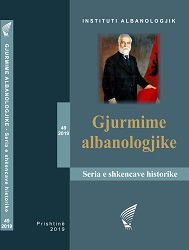TRAKTATI I LOZANËS DHE SHQIPTARËT
THE TREATY OF LAUSANNE AND ALBANIANS
Author(s): Ilirjana Kaceli‐DemirlikaSubject(s): Political history, International relations/trade, Politics and society, Interwar Period (1920 - 1939), Migration Studies
Published by: Instituti Albanologjik i Prishtinës
Keywords: Treaty of Lausanne; Greek-Turkish agreement; exchanging population; Albanian cooperation with Greece;
Summary/Abstract: In the period between the two world wars one of the international treaties that echoed but also brought many problems and was widely discussed was the Treaty of Lausanne. The treaty was signed on January 30, 1923, between Greece and Turkey, the two Balkan states where as the main topic was the exchange and displacement agreement of the population between the two countries. This agreement and especially the issue of the exchange of the population between the two countries would indirectly affect Albania because in this exchange as an "exchanged minority" was included the Albanian Muslim population of the province of Chameria. Both countries and their governments did not recognize the nationality of this Albanian population, did not acknowledge the existence of the province as a notion, but also the separation of religion and the state. And this strategy was very much in line with the policies that would be followed by both governments, through which they would have it easier to carry out the population exchange. This fact caused the exasperation of the Albanian party and the increasing of its efforts in the international arena to accomplish the rescue of this population so it wouldn’t be part of this exchange. This treaty would later be a factor that would also affect the newly established Albanian-Turkish relations. As the Albanian Government couldn’t find a way of cooperation with Greek government, it had to return to discussions with the Turkish party. This pressure was made at a time when Albania's position had just been affirmed in Turkish diplomacy. Specifically, for this reason Turkey's position has been initially pro to this exchange in favor of the Greek side causing a great indignation in the Albanian diplomatic circles and the Albanian Colony of Istanbul. After, by increasing the course of talks and efforts in the diplomatic field and also trying to convince the government of Ankara, the latter was more disposed towards the Albanian Orthodox population, being in its best interest for it to be Albanians than Greeks. The government of Ankara somehow changed its political course by setting as a condition the determination and implementation of the criteria for the exchanged population. The main sources of these materials in this article are: The archive of the Ministry of Foreign Affairs of Albania and the Archives of the Turkish Republic, as well as the various historical publications of this period as well as newspapers from 1920-1930.
Journal: Gjurmime Albanologjike - Seria e shkencave historike
- Issue Year: 2019
- Issue No: 49
- Page Range: 247-265
- Page Count: 19
- Language: Albanian
- Content File-PDF

